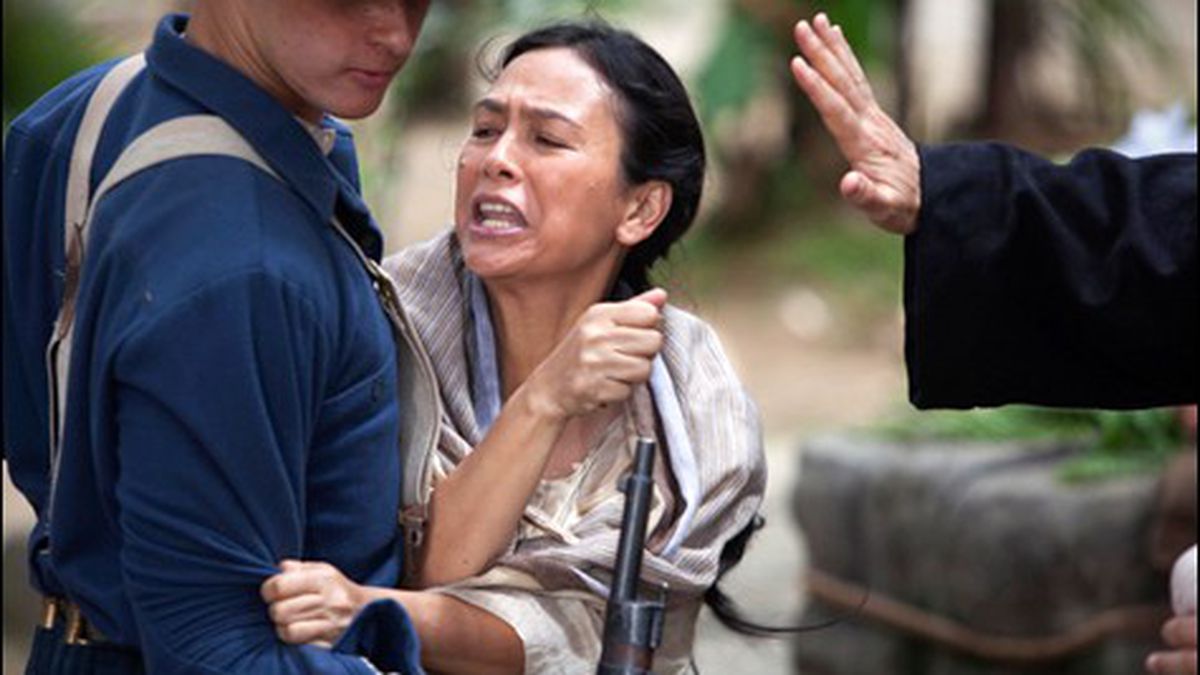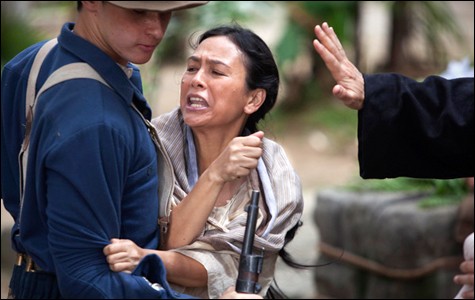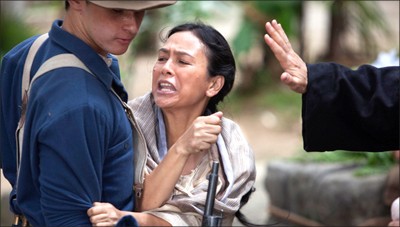It’s a shame that John Sayles’ Amigo has been booked into Filipino neighborhoods in the Bay Area but apparently not (yet) in theaters in Oakland and Berkeley. Sayles, writer-director of such indie dramas as Lone Star, Men with Guns, and Matewan, has been a mainstay of politically involved filmmaking since the late Seventies, and his take on the Philippine-American War of slightly more than a hundred years ago has just as much to say to general audiences as it does to Filipino Americans.
The film trods more or less the same ground as Sayles’ 2011 epic novel A Moment in the Sun — the era of America’s so-called “Manifest Destiny,” when the expansive, confident, newly industrial nation began to think of itself as a world power and a force to be reckoned with. As a legacy of the Spanish-American War of 1898, victorious US soldiers were sent to the Philippines to pacify the captured Spanish colony and bring it into the American orbit. Independent-minded Filipinos under the leadership of Emilio Aguinaldo had already formed armed bands to fight the Spaniards, and now the US Army was ordered to stop the insurrectos.
Amigo picks up the action in 1900 in the baryo of San Isidro somewhere on the main island of Luzon. Rafael Dacanay (played by Filipino movie idol Joel Torre), capitan of the village and a prosperous rice farmer, finds himself caught between his loyalty to his brother Simón (Ronnie Lazaro), leader of a rebel group hiding in the mountains nearby, and the newly arrived company of yanqui soldados dispatched to quell the rebellion. Any similarities between this situation and America’s conflicts in Vietnam, Iraq, Afghanistan, etc., are absolutely intentional, right down to “strategic hamlets” and the concept of “nation-building.”
Even though the commanding officer, the appropriately named Col. Hardacre (Sayles regular Chris Cooper), is the type to shoot first and ask questions later, the officer in charge of the village, Lt. Compton (Garret Dillahunt), seems sympathetic to the Filipinos — this despite prevailing American attitudes toward the “goo-goos” and “monkeys” portrayed in the outrageously racist newspaper cartoons of the times. The American soldiers echo these slurs, although one of the enlisted men (Dane DeHaan) manages to fall in love with a young village woman. Sayles makes sure not to paint the GIs as total monsters — it’s US policy to institute free elections for public office, a move that the people of San Isidro applaud.
The most perplexing figure is Padre Hidalgo (Hollywood actor Yul Vasquez), the snide, condescending Catholic priest of San Isidro who encapsulates the Spanish view of the natives as childlike primitives best kept in line by stern doses of religion and force. Not surprisingly, most of the villagers are contemptuous of him and his pompous ideas of holy war. Meanwhile Rafael, surrounded by the priest, the soldiers, his envious neighbors, and the rebels, realizes that he was doomed the minute the Americans came along. The film keeps several balls in the air simultaneously while never actually taking sides.
Amigo was filmed on the island of Bohol in the Visayas chain, not terribly far from where the modern Philippine government is waging its seemingly endless holding action against Muslim insurgents. Sayles’ main point seems to be that national liberation, never an easy task, is subject to the same peccadilloes and ironies as human endeavor in general, times ten. The green young yanqui troops in San Isidro don’t belong there in the first place, yet we have a hard time seeing them as imperialists, even though that’s what they are. They’re the great-grandfathers of today’s American armed forces. Some things never change.

















